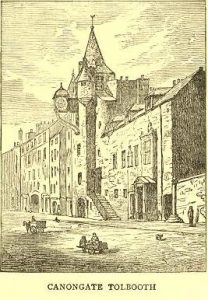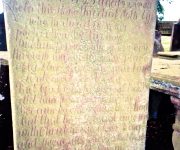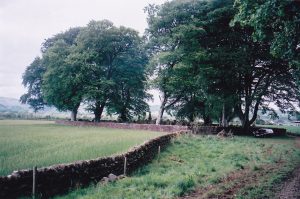There is an unresolved mystery concerning the Enterkin Rescue. James Harkness is widely considered the leader of the band of men who carried out the rescue. He was captured along with his brother Thomas, Andrew Clerk and Samuel MacEwan. Along with the others he was taken to Edinburgh, imprisoned, interrogated and indicted for trial. There is no doubt about this as the facts were recorded in the Scottish Criminal Records which still exist.
The puzzling question is, why, after being indicted along with the others, was his name struck off the indictment and, while the others were tried, found guilty and executed, James was excluded from this process and apparently left in prison. There are a few possible answers.
It might be suggested that James was spared because he struck a deal – agreed to give evidence or information against others. There are a number of reasons to doubt this. Firstly at that moment, following the impact that the Rescue had and the reaction to it by the government and that James was considered the prime instigator, it seems unlikely there is anything he could have offered that would outweigh the government’s need to make an example of him. Also if he had betrayed or offered to betray his comrades it would have become common knowledge and caused outrage. Word of such treachery would have spread immediately. There is conclusive proof that James, after his escape from the Canongate Tolbooth, went home to Dumfriesshire and lived in the community for many years. He would also appear to have continued actively supporting the Covenanting cause.
His tombstone is in Dalgarnock graveyard beside other family members, including his brother Thomas’s son records his death in 1723 aged 72 years. It states he had been the subject of persecution for 28 years. We don’t know when or by whom the stone was erected but it seems clear that James enjoyed a good reputation and is considered in many accounts of the times as a hero and martyr.[box]Dalgarnock Graveyard
“Here lyes the body of James Harkness in Locherben who died 6th Dec. 1723 aged 72 years Belo this stone his dust doth ly who endured 28 years Persecution by tyranny— Did him pursue with echo and cry Through many a lonesome place At last by Clavers he was taen— Sentenced for to dy; But God, who for his soul took care, Did him from prison bring Because no other cause they had But that he ould not give up With Christ, his glorious King, And swear allegence to that beast The Duke of York, I mean, In spite of all there hellish rage A natural death he died In full assurance of his rest With Christ ietemalie.”
The Martyr Graves of Scotland Page 435[/box]
Another possible reason for James not going to trial and the gallows on 15th August 1684, was that he might have been considered a potential source of information to be obtained under torture. Torture was part of the judicial process. Torture of potential witnesses in the Canongate Tolbooth is recorded in the Register of the Privy Council of Scotland at this very time. There were others who were suspected of being involved and it is possible that James was seen as a potential source of evidence or information about them.
Another possibilty was that James was saved by the intervention of Claverhouse himself. In some accounts of these times there is mention that Claverhouse had offered James Harkness a captaincy in the government forces, but James had turned the offer down. Claverhouse was a complex character and although he had a reputation amongst the Covenanters for being ruthless and cruel, there are also records of him showing compassion and leniency.Perhaps Claverhouse saw in James Harkness a fellow combatant worthy of his respect and magnanimity. It seems unlikely though, given the seriousness of the event at Enterkin, that such an intervention would have been possible.



